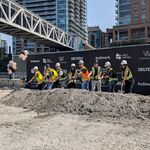EUG, I assume from the part you are quoting of this article., you expect 2010 to be a rough ride and with a significant burst. Are you expecting 30% or even 50% like is seen in florida and Arizona and /or even more price declines?
As someone with "skin in the game", I admit I don't know the answer but I am not one in the doom and gloom camp. that said, I was wondering if EUG is?
No. I'm just posting the article. While he presents both sides, it seems the author is suggesting a bust is imminent.
For Toronto, I've been predicting a 10-15% pullback... from 2007 levels. However, I've been predicting that since 2007.

I have some "skin" in the game, but it doesn't concern me as much as some since a lot of that skin came from a couple of situations that mitigate the concern:
1) It's my primary home, not an "investment" per se.
2) My first big real estate foray started in the late 90s, but this was a condo townhouse... and I happily watched it increase in price until I sold in 2007. And that was my primary home too.
3) I cashed in a bunch of stocks and mutual funds in 2006 and 2007 and stuck the cash in the bank, and then used the money for a downpayment for a detached house. I also put all the proceeds from the sale of my condo into the mortgage for the detached home. So, I have lots of equity in my home, and I am on track to have it paid off in less than 10 years.
4) I don't like renting.
5) The following year, the worlds' economies imploded. So, had I not put my money into a home I would have been much worse off, as I sold much of my stock/mutual funds near 2007's peak. The "safest" hedge might have just have been to get out of both the stock market and the real estate market, but then I wouldn't have a place to live. See #4 above.
I find that when my predictions come true (but note that they often don't), I'm usually 2-3 years too early. I was worried that the stock market would drop significantly (although not to the extent that it did), which is why I started cashing out as early as 2006, even though I wasn't planning on buying until 2007-2008.
6) When I did buy in 2007, I was worried the market was already too high, but not outrageously so, and I felt that in 2007, 2005ish price levels were more reasonable. That's where the 10%+ comes from. I told myself if prices dropped 10% I could accept that, but if prices dropped over 20%, I'd be very annoyed. Note also that I bought in a buyers' market at significantly less than asking price, and I sold my condo at the same time in a bidding war at significantly higher than my asking price. In truth, I think the house I bought was overpriced, but the price I paid for it was reasonable. The price I got for selling my condo was noticeably higher than I was expecting though.
As for 2010, I think there is potential for a rough ride, but my guess is that interest rates will not rise suddenly. They will rise, but I think it's less likely they'll hit say 7% for a 5-year fixed in the next two years. If this prediction is correct, this will put downward pressure on prices, but hopefully won't cause a sudden and big crash. The rougher ride may be in 2011-2012 as interest rates continue to rise. But even then, I'm not predicting a big crash.




